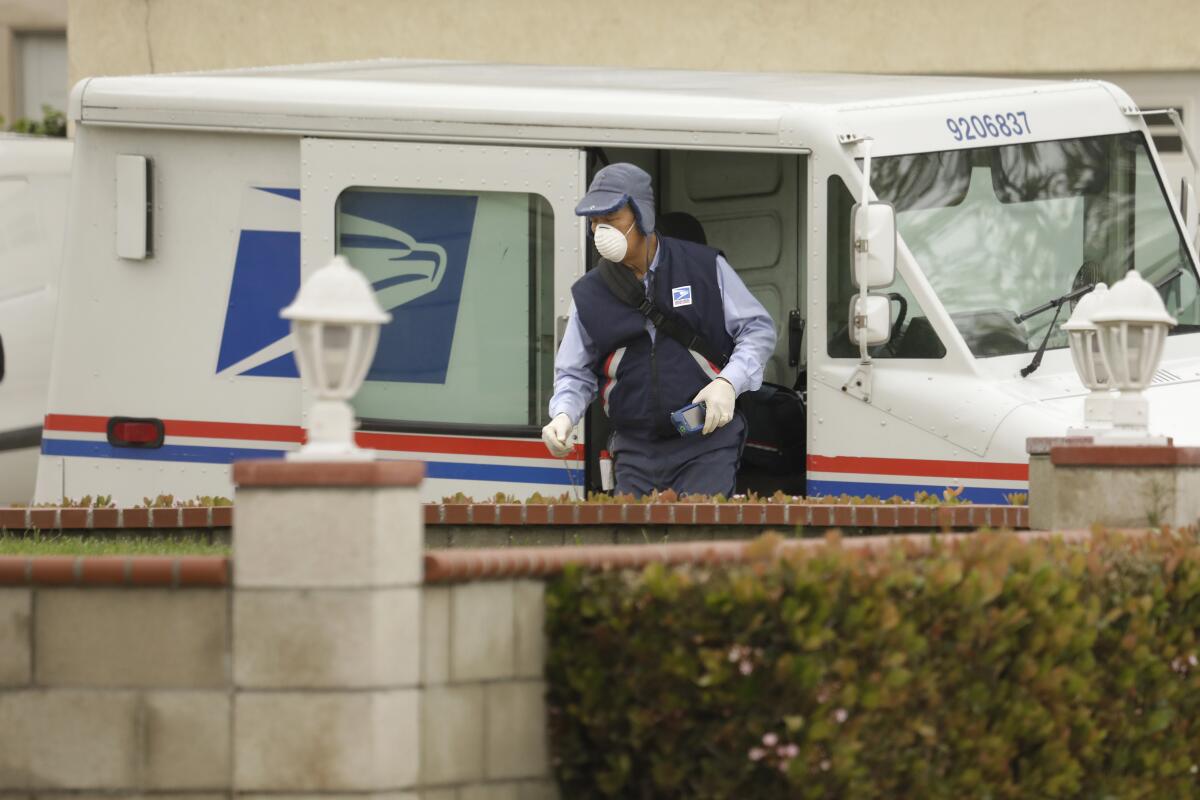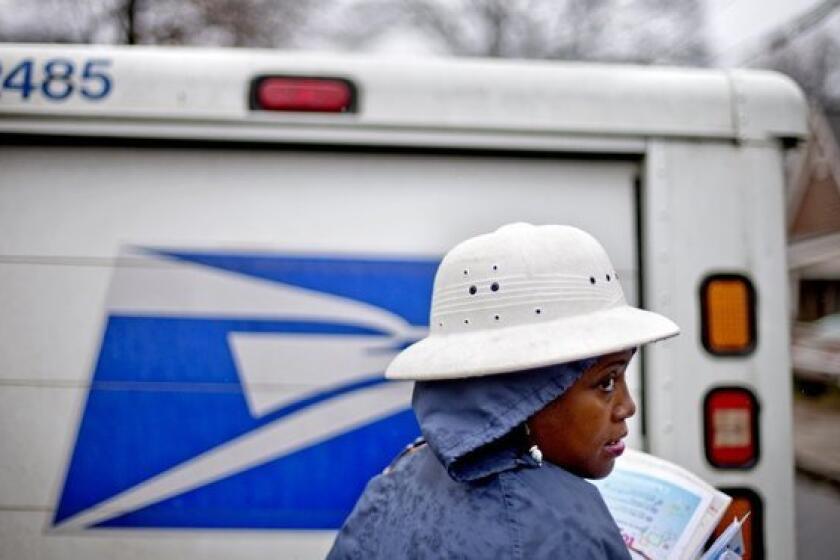Op-Ed: With our government failing us, crowdsourcing is America’s social safety net now

If you’re like me, your social media feeds have been featuring grim news from institutions that once seemed — falsely, it turns out — unassailable. First for me was City Lights Books, which on April 9 announced a GoFundMe campaign to address “dwindling” cash reserves; without it, the store, first opened in 1953 in San Francisco’s North Beach, was at risk of shutting down for good.
Next was the U.S. Postal Service, which employs 600,000 people and was left out of the stimulus packages recently signed into law. “The Post Office will likely run out of money sometime between July and September of this year,” American Postal Workers Union President Mark Dimondstein told New York magazine. “If they run out of money, then the people lose the service.”
The financially imperiled post office, under attack by President Trump, has become a potent symbol for a Democratic Party looking for unifying causes.
Finally, there are the news outlets, including this one, that have furloughed or laid off staff and reduced salaries in the wake of a catastrophic loss of advertising revenue — some 33,000 media workers thus far, according to the New York Times. The situation is dire enough that Ohio Democratic Rep. Tim Ryan wrote last month to House Speaker Nancy Pelosi (D-San Francisco) to request that journalists and periodicals be protected in future stimulus plans.
It’s just the tip of the iceberg. Lambda Literary, Small Press Distribution, Amoeba Music, Micky’s Nightclub in West Hollywood: Whatever your community, you’ve likely been tapped one way or another by businesses, organizations, whole industries in need. I’m grateful to be able to chip in — making donations, re-upping subscriptions, buying stamps online (the Post Office was happy to deliver them; delivery is what it was designed to do) — but I also have to wonder: If all that’s holding these entities together is crowdsourced funding, what is going to survive?
Don’t get me wrong: I’m in favor of engaged citizenship. We must support the services and institutions that matter to us. It is a shared responsibility. No organization can stay in business just because we wish it would.
At the same time, at least some of what I support should be getting a boost from Washington. How can we not recognize bookstores and newspapers and the Post Office as essential industries? We need reading and writing, and accurate reporting on the pandemic. We need dependable, affordable pickup and delivery so voting by mail, counting the census, paying bills and getting paychecks, not to mention medications for millions, can be handled reliably, every day in a system that is public, not private.
Without doubt, our grassroots engagement is inspiring — including individuals using 3-D printers to make face shields for frontline healthcare workers. What it suggests is that, in the face of a national leadership vacuum, we — individuals, as well as local communities — are stepping up. This is also the case with many states, which have formed regional alliances to crowdsource plans for reopening, and researchers and labs, which have coordinated and collaborated in spite (or because) of the floundering federal response.
At the same time, this sort of do-it-yourself, self-service propping up of society is discomfiting. It speaks to the collapse of something we once imagined we could take for granted: national competence. We are watching in real time the splintering of can-do America, the further devastation of a safety net already frayed by stymied or craven officials and an economic system built on speculation and consumption — a false and catastrophic set of premises even before the pandemic hit.
The argument in favor of DIY is self-sufficiency, and the argument for self-service is convenience, but individual action can only go so far. What this means is that, even as I click to donate or buy in these hard times, I can’t help but wonder how many “crowds” are big enough and enthusiastic enough to make crowdsourcing count.
City Lights raised nearly half a million dollars in 10 days, a sum that will help keep the store open — for now. But the one thing we can say for certain about money is that it always runs out, which means that another crowdfunding effort is almost certainly in the future, and another and another, depending on when and if our book buying and selling habits can return to what they were.
For the Post Office or the news media, both of which are targets of the president, the future remains even more a question mark. Meanwhile, you only need visit the GoFundMe website to see the businesses that aren’t making it, that aren’t reaching even modest funding goals.
“Government is not the solution to our problem,” Ronald Reagan averred in 1981, in his first inaugural address. “Government is the problem.” He was wrong then and now, but especially when it comes to a crisis such as this.
What do we do? We keep doing what we can. When government fails us, we have no other option but to give to the extent that we are able in this crowdsourced society that we have, unwittingly or otherwise, constructed for ourselves.
David L. Ulin is a contributing writer to Opinion.
More to Read
A cure for the common opinion
Get thought-provoking perspectives with our weekly newsletter.
You may occasionally receive promotional content from the Los Angeles Times.











